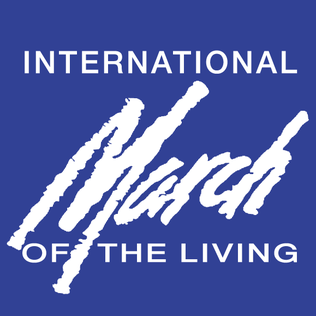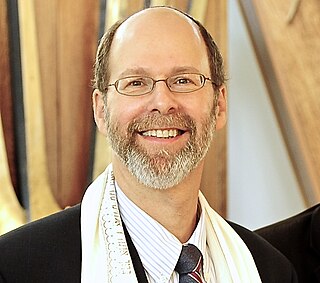
Bat-Sheva Ofra Haza was an Israeli singer, songwriter and actress, commonly known in the Western world as "the Madonna of the East", or "the Israeli Madonna". Her voice has been described as a "tender" mezzo-soprano. In 2023, Rolling Stone ranked Haza at number 186 on its list of the 200 Greatest Singers of All Time.

Yom HaZikaron laShoah ve-laG'vurah, known colloquially in Israel and abroad as Yom HaShoah and in English as International Holocaust Remembrance Day, or Holocaust Day, is observed as Israel's day of commemoration for the approximately six million Jews murdered in the Holocaust by Nazi Germany and its collaborators, and for the Jewish resistance in that period. In Israel, it is a national memorial day. The first official commemorations took place in 1951, and the observance of the day was anchored in a law passed by the Knesset in 1959. It is held on the 27th of Nisan, unless the 27th would be adjacent to the Jewish Sabbath, in which case the date is shifted by a day.

David Simon Berwick Broza is an Israeli singer-songwriter. His music mixes modern pop with Spanish music.

Mordechai Werdyger is an American Israeli Chasidic Jewish singer and songwriter who is popular in the Orthodox Jewish community. He is the son of cantor David Werdyger and uses the stage name Mordechai Ben David or its initials, MBD. He is known as the "King of Jewish Music" and has released over 40 albums while performing internationally. He has headlined at charity concerts—including those of the HASC and Ohel. On February 27, 2022, he was inducted with the inaugural class of the Jewish Music Hall of Fame.

The March of the Living is an annual educational program which brings students from around the world to Poland, where they explore the remnants of the Holocaust. On Holocaust Memorial Day observed in the Jewish calendar, thousands of participants march silently from Auschwitz to Birkenau.

Israel has participated in the Eurovision Song Contest 45 times since making its debut in 1973. Israel was able to enter the contest as the Israel Broadcasting Authority (IBA) was an active member of the European Broadcasting Union (EBU), which was responsible for the event. The IBA was succeeded as the broadcaster in charge of the Israeli entry by the Israeli Public Broadcasting Corporation (IPBC/Kan) in 2018. Israel has won the contest four times, and has hosted the contest in Jerusalem in 1979 and 1999, and in Tel Aviv in 2019.

The Kdam Eurovision in short known as the Kdam was the Israeli national preselection of the Eurovision Song Contest. The competition was first introduced in 1981 and ran until 2014.

Shlomo Gronich is an Israeli composer, singer, songwriter, arranger, and choir conductor.
For the purposes of this article, “contemporary” refers to the period from 1967 to the present day, “Jewish” refers to the various streams and traits of Judaism practiced. Many Orthodox Jews use the term “religious” to refer to a strict adherence to Jewish law. For the purposes of this article, “religious” refers to the content and context of the music itself: liturgical or implicit references to the divine.
Abie Rotenberg is a prolific Orthodox Jewish musician, composer and entertainer from Toronto, Ontario, Canada. He has been producing music since the mid-1970s with a style which has been described as "soft and sweet" with a strong folk influence.
Lay Down Your Arms may refer to:
Congregation Habonim Toronto, founded in 1954, is a liberal reform synagogue located at 5 Glen Park Avenue in Toronto, Ontario, Canada, and one of the first Holocaust refugee/survivor congregations to develop in Canada. Although currently independent of any official denomination, its early founders modeled the synagogue on the example of early Reform Judaism in Germany.
Ari Goldwag is an American Orthodox Jewish singer, songwriter, composer, and producer of contemporary Jewish religious music, as well as an author and teacher living in Ramat Beit Shemesh, Israel. He was a soloist for the Miami Boys Choir at age 10 and starred on five albums and three videos before his voice changed at age 14. He launched a music career after his marriage and move to Israel. He has released eight solo albums, and composes songs and produces albums for other artists.
Esther Ghan Firestone was the first female cantor in Canada, although she was not ordained. She began as a cantor in the mid-1950s at Toronto’s Temple Beth-El, and worked in Toronto at Temple Beth-El, Temple Emanu-El (1977), and later at Congregation Habonim Toronto from 1985 until some time in 2015. She was also a member of Kol Nashim, a sextet of female lay cantors founded in 1987.
Heedoosh is an Israeli-American Jewish hard rock band from New York City. They were formed in 2005 by brothers Yaniv and Yahav Tsaidi, and released their debut album, Meumkah Delibah, in 2006.

Blind Love: A Holocaust Journey Through Poland with Man's Best Friend is a 2015 documentary film about blind Israelis traveling to Poland with the help of their guide dogs, to learn about the Holocaust. Footage includes blind participants taking part in the 2012 and 2013 March of the Living programs. The film is narrated by Michael Enright of the Canadian Broadcasting Corp.
Pigeon is a short film by Canadian director Anthony Green. It was produced by Emmy and Gemini nominated Canadian producer Karen Wookey. Jay Firestone was executive producer of the film.
"A Walk to Caesarea", also commonly known by the opening words "Eli, Eli" in the song version, is a poem in Hebrew written in 1942 by Hungarian Jewish WWII resistance fighter Hannah Szenes, which Israeli composer David Zehavi set to music in 1945. Szenes wrote the poem while residing in kibbutz Sdot Yam which is located a short distance along the Mediterranean coast from the ancient port town of Caesarea.

Eli Rubenstein is a Holocaust educator, writer, and filmmaker. He is currently the religious leader of Congregation Habonim Toronto, a Toronto synagogue founded by Holocaust survivors.

Ishay Ribo is an Israeli singer-songwriter. A Sephardic Orthodox Jew, he has gained popularity in Israel among Haredi, national-religious, and secular Jewish audiences. He has released four studio albums, two of which have been certified gold and one which went platinum.











